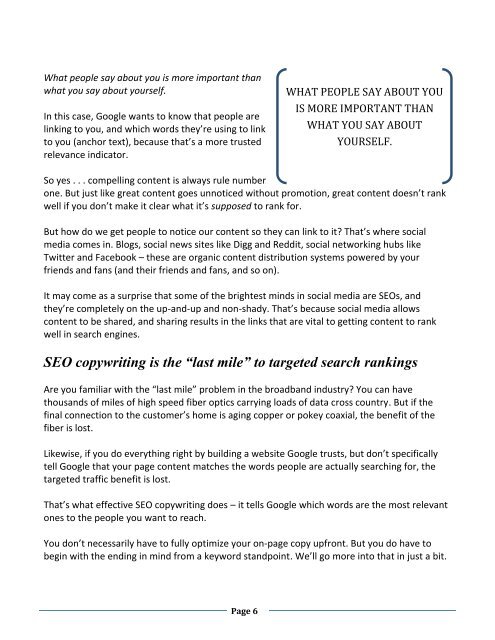How to Create Compelling Content
How to Create Compelling Content That Ranks Well in Search Engines This free 27-page report by Copyblogger founder Brian Clark provides you a step-by-step strategy for creating content that scores links, is highly readable and engaging, and ranks well in
How to Create Compelling Content That Ranks Well in Search Engines This free 27-page report by Copyblogger founder Brian Clark provides you a step-by-step strategy for creating content that scores links, is highly readable and engaging, and ranks well in
Create successful ePaper yourself
Turn your PDF publications into a flip-book with our unique Google optimized e-Paper software.
What people say about you is more important than<br />
what you say about yourself.<br />
In this case, Google wants <strong>to</strong> know that people are<br />
linking <strong>to</strong> you, and which words they’re using <strong>to</strong> link<br />
<strong>to</strong> you (anchor text), because that’s a more trusted<br />
relevance indica<strong>to</strong>r.<br />
So yes . . . compelling content is always rule number<br />
one. But just like great content goes unnoticed without promotion, great content doesn’t rank<br />
well if you don’t make it clear what it’s supposed <strong>to</strong> rank for.<br />
But how do we get people <strong>to</strong> notice our content so they can link <strong>to</strong> it? That’s where social<br />
media comes in. Blogs, social news sites like Digg and Reddit, social networking hubs like<br />
Twitter and Facebook – these are organic content distribution systems powered by your<br />
friends and fans (and their friends and fans, and so on).<br />
It may come as a surprise that some of the brightest minds in social media are SEOs, and<br />
they’re completely on the up-and-up and non-shady. That’s because social media allows<br />
content <strong>to</strong> be shared, and sharing results in the links that are vital <strong>to</strong> getting content <strong>to</strong> rank<br />
well in search engines.<br />
SEO copywriting is the “last mile” <strong>to</strong> targeted search rankings<br />
Are you familiar with the “last mile” problem in the broadband industry? You can have<br />
thousands of miles of high speed fiber optics carrying loads of data cross country. But if the<br />
final connection <strong>to</strong> the cus<strong>to</strong>mer’s home is aging copper or pokey coaxial, the benefit of the<br />
fiber is lost.<br />
Likewise, if you do everything right by building a website Google trusts, but don’t specifically<br />
tell Google that your page content matches the words people are actually searching for, the<br />
targeted traffic benefit is lost.<br />
That’s what effective SEO copywriting does – it tells Google which words are the most relevant<br />
ones <strong>to</strong> the people you want <strong>to</strong> reach.<br />
You don’t necessarily have <strong>to</strong> fully optimize your on-page copy upfront. But you do have <strong>to</strong><br />
begin with the ending in mind from a keyword standpoint. We’ll go more in<strong>to</strong> that in just a bit.<br />
Page 6<br />
WHAT PEOPLE SAY ABOUT YOU<br />
IS MORE IMPORTANT THAN<br />
WHAT YOU SAY ABOUT<br />
YOURSELF.

















